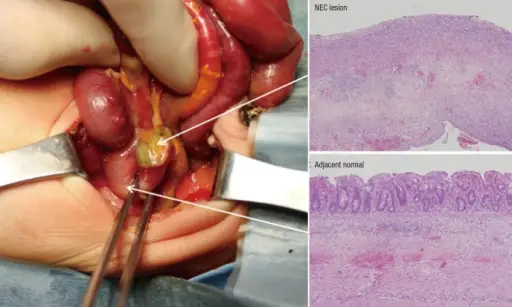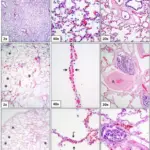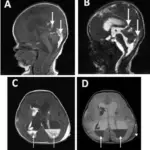Necrotizing enterocolitis is a serious gastrointestinal problem that mostly affects premature babies. The condition inflames intestinal tissue, causing it to die. A hole (perforation) may form in the baby’s intestine.
What is the Pathology of Necrotizing Enterocolitis?
The pathology of necrotizing enterocolitis is:
–Etiology: The cause of necrotizing enterocolitis is when tissue in the large intestine (colon) gets inflamed. Low birth weight, small for gestational age, low gestational age, assisted ventilation, premature rupture of membranes, sepsis, and hypotension have been issues associated with causing necrotizing enterocolitis.
–Genes involved: IL-4Rα gene.
–Pathogenesis: The sequence of events that lead to necrotizing enterocolitis are intestinal immaturity that leads to a compromised intestinal epithelial barrier, an underdeveloped immune defense, and altered vascular development and tone. The compromised epithelial barrier and underdeveloped immune system, when exposed to luminal microbiota that have been shaped by formula feedings, antibiotic exposure, and cesarean delivery, can lead to intestinal inflammation and sepsis.
–Morphologic changes: The morphologic changes involved with necrotizing enterocolitis are tissue in the small or large intestine is injured or inflamed, that may cause transmural inflammation, transmural necrosis, and even perforation.
How does Necrotizing Enterocolitis Present?
Patients with necrotizing enterocolitis are typically male premature infants who weigh less than 1000 g at birth. The symptoms, features, and clinical findings associated with necrotizing enterocolitis include vague symptoms like irritability, excessive crying, abdominal pain, and perhaps elevated temperature.
How is Necrotizing Enterocolitis Diagnosed?
Necrotizing enterocolitis is diagnosed by abdominal X rays, fecal analysis, and blood tests to check for infections.
How is Necrotizing Enterocolitis Treated?
Necrotizing enterocolitis is treated by nasogastric tube suction of gas and fluids, antibiotics for infections, stopping feeding, providing nutrients through IV catheter, and gastrointestinal surgery intervention.
What is the Prognosis of Necrotizing Enterocolitis?
The prognosis of necrotizing enterocolitis is good. Most infants recover fully and do not have further feeding problems. Some babies may have future gastrointestinal problems like constipation, diarrhea, and malabsorption.



